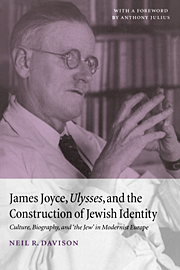 James Joyce, Ulysses, and the Construction of Jewish Identity
James Joyce, Ulysses, and the Construction of Jewish Identity Book contents
- Frontmatter
- Contents
- Foreword by Anthony Julius
- Acknowledgements
- List of abbreviations
- Introduction
- 1 Silence: family values
- 2 Silence: Jesuit years – Clongowes and Belvedere
- 3 Silence: university years – the Church, Dreyfus, and aesthetics
- 4 Exile: excursion to the Continent, bitter return
- 5 Cunning and exile: Greeks and Jews
- 6 Cunning: Jews and the Continent – texts and subtexts
- 7 Cunning: the miracle of Lazarus times two – Joyce and Italo Svevo
- 8 Ulysses
- Conclusion
- Notes
- Select bibliography
- Index
Conclusion
Published online by Cambridge University Press: 05 April 2012
- Frontmatter
- Contents
- Foreword by Anthony Julius
- Acknowledgements
- List of abbreviations
- Introduction
- 1 Silence: family values
- 2 Silence: Jesuit years – Clongowes and Belvedere
- 3 Silence: university years – the Church, Dreyfus, and aesthetics
- 4 Exile: excursion to the Continent, bitter return
- 5 Cunning and exile: Greeks and Jews
- 6 Cunning: Jews and the Continent – texts and subtexts
- 7 Cunning: the miracle of Lazarus times two – Joyce and Italo Svevo
- 8 Ulysses
- Conclusion
- Notes
- Select bibliography
- Index
Summary
James Joyce's refigurations of a range of European cultural assumptions about “Jewishness,” as well as his confrontation of anti-Semitic nationalism, are invaluable. Joyce sought to challenge his era's dominant discourse surrounding “the Jew” by presenting a character who was a Jew, but also not a Jew, viewed both from within and from without. By imagining Bloom's conflict as one of Jewish identity, Joyce achieved an empathy for the paradoxes of Jewish marginality perhaps unequaled by any writer since. Moreover, Bloom's triumph embodies Joyce's beliefs in precisely which aspects of a positive “Jewishness” are most empowering: recognizing his own sense of Judaically-based “Jewishness” and thus rising above stereotype, Bloom the uncircumcised-converted-agnostic-cuckold re-establishes his self-respect as a Jew and as a man, and thus reaffirms his responsibility toward humanity. To read the realist novel that is Ulysses without recognizing this dynamism at the center of its narrative is, essentially, to misread Ulysses.
The idea that culture can only be re-evalutated from the position of the Other has of course become one of the intellectual staples of our age. Realizing how alienated his own sense of “Irishness” had made him to the Irish, British, and European cultures of his day, Joyce confronted his own Otherness by becoming fascinated with another type – perhaps the most entrenched “Other” in all of Europe. Bloom's final acceptance of his own “Irish-Jewishness” represents a victory for difference by demonstrating how essentialist and constructivist theories play on the act of self-making. And if the experiences of June 16 begin for Bloom a reshaping of his identity, then such a breakthrough indeed centers on his “Jewishness.”
But like Stephen Dedalus, the character who Joyce abandoned to create Bloom, the apostate author may have never solved his own conflict with Irish Catholicism.
- Type
- Chapter
- Information
- James Joyce, Ulysses, and the Construction of Jewish IdentityCulture, Biography, and 'the Jew' in Modernist Europe, pp. 240 - 242Publisher: Cambridge University PressPrint publication year: 1996


